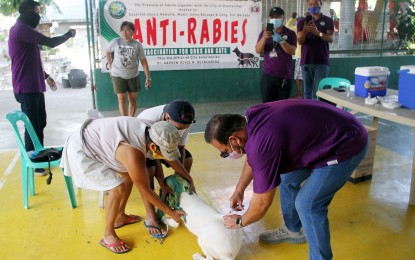
A dog gets an anti-rabies shot. (PNA photo by Gil Calinga)
MANILA – The Philippines has logged 55 cases of rabies as of Feb. 25, an eight percent increase as compared to the same period last year.
In an online Kapihan media forum on Friday, Department of Health-Epidemiology Bureau Director Alethea de Guzman noted that the tally was four cases higher than the 51 cases reported last year.
“Kapag sinabing kaso, ito na rin ba ‘yung namatay (When you say cases, are these also fatalities). As mentioned, rabies is almost 100 percent fatal and all these 55 cases that I’m talking about in 2023 are all deaths,” she said.
Among the regions that reported human rabies cases, Central Luzon logged the highest number with 11 cases or 20 percent. It is followed by Region 4-A (Calabarzon) with nine cases or 16 percent; Bicol Region with five cases or nine percent; Northern Mindanao with four cases or seven percent; and Davao Region with four cases or seven percent.
As of 2020, eight out of the 81 provinces are declared rabies-free by the DOH together with concerned government agencies. These are Siquijor, Batanes, Biliran, Camiguin, Marinduque, Dinagat Islands, Catanduanes and Romblon.
About 54 percent of the human rabies cases nationwide are individuals ages 20 to 59 years old since 2008 to 2023 and 72 percent of the reported cases are among the male sex.
Rabies causes around 59,000 human deaths per year worldwide with 95 percent of these occurring in Asia and Africa, according to the World Health Organization.
Around 40 percent of the cases are children aged 15 years old and below.
Domestic dogs are responsible for the transmission from affected animals to humans in up to 99 percent of the reported cases.
“Hindi kesyo alaga natin, safe tayo. Kelangan bakunado and up-to-date ang bakuna sa ating mga alagang aso para kahit makagat tayo, tayo ay protektado (Not because they are our pets, we’re already safe. Our dogs must be vaccinated, and their vaccination must be updated, so in case we get bitten, we are protected) from rabies,” de Guzman said. (PNA)
